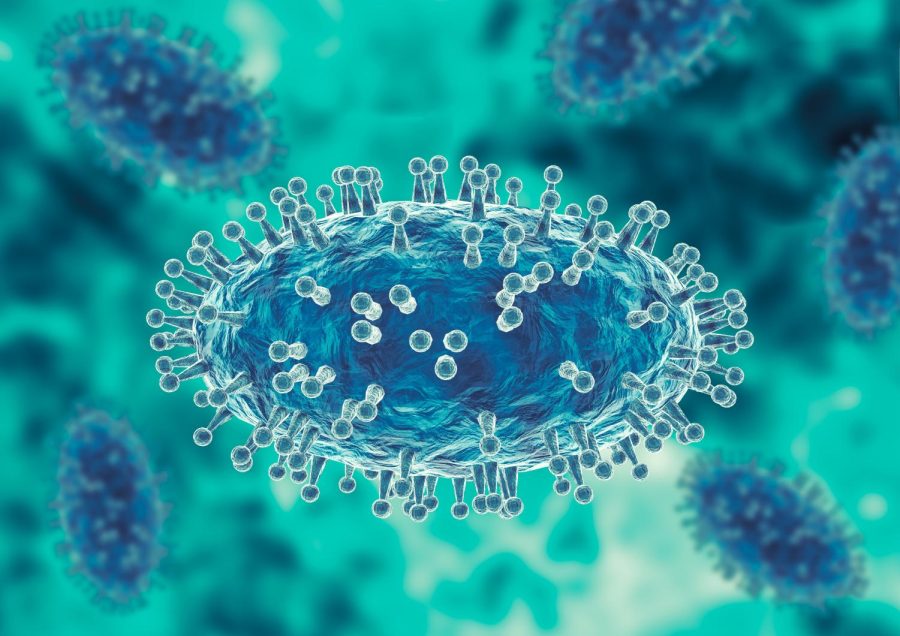Opinion | How to discuss monkeypox
How better messaging can help the monkeypox outbreak.
August 2, 2022
So you heard about monkeypox, let’s talk about it.
Monkeypox has begun spreading in countries without a history of monkeypox, including the U.S. This has raised concerns among many communities who are unfamiliar with the disease.
Previous outbreaks, like HIV/AIDs, have shown how messaging can increase harmful stigmas to communities. We need to learn from past mistakes to better treat monkeypox.
Most people in the country are likely unfamiliar with monkeypox. The disease is not naturally found in the U.S., but cases have appeared in the U.S. before from international travel or importing animals.
Monkeypox is a disease caused by infection of the monkeypox virus. Though rarely fatal, the disease can cause symptoms of headache, fever, muscle ache, chills, exhaustion, respiratory issues and rash.
Monkeypox is a viral infection spread through close, personal contact. This includes intimate contact with a sexual partner(s). Antibiotic therapy is not used to treat viral infections.
The majority of cases have been found in men who have sex with men. This community, typically referred to as MSM, is not exclusive to people who identify as gay. MSM includes homosexual men, bisexual men, and can impact people who are transgender or non-binary.
While monkeypox can be transmitted via sexual contact, this is not the only way of transmission. Monkeypox can spread through non-sexual actions, including direct contact with monkeypox rashes, scabs, or body fluids. The disease can also spread by touching infected objects, fabrics (bedding, towels, clothing) and through contact with respiratory secretions.
The World Health Organization (WHO) reports nearly 98 percent of monkeypox cases have been found in MSM communities. Although this percentage is high, this does not limit the risk of other people catching monkeypox. In the U.S., there has been two confirmed cases of monkeypox in children.
So, monkeypox is not a sexually transmitted disease (STD) because it spreads through non-sexual actions. Thus, people in the MSM community are not the only people at risk of contracting monkeypox. But, not everyone is aware of this.
Previous outbreaks, like HIV/AIDs, have shown how messaging can increase harmful stigmas to communities.
In the early 1980s, a political movement called the “moral majority” worked actively against gay rights. At this time, the human immunodeficiency virus (HIV) epidemic emerged in the U.S. For members of the moral majority, HIV was an outlet to discriminate and stigmatize the MSM community.
As a result, not only were people discriminated against for their sexual orientation, but many people were not able to receive needed medical care because of the heavy stigma against individuals with HIV. Mistakes made in the HIV epidemic should influence how we talk about monkeypox now.
Messaging is how we talk about monkeypox. This includes the language, direction, and emphasis we place on discussions about monkeypox.
As the virus spreads, all individuals should be cautious about how they discuss the disease. This is especially important on a college campus.
Most young college students, like myself, have been in settings where offensive, harmful, or careless language was present. Considering the majority of monkeypox cases have been in MSM communities, some may use monkeypox to justify homophobic language and stigmatization.
Monkeypox is not exclusive to any community, and it’s not a joke. Messaging and discussions surrounding monkeypox should address communities most vulnerable to the disease. But messages and discussions should not give an opportunity to stigmatize and degrade MSM communities.
If you find yourself in a setting where conversations surrounding monkeypox are misinformed or malicious, it’s important you speak up to prevent harmful stigmas from forming.
The more people understand monkeypox, the faster the disease can be contained. For that to happen, people must understand that the disease is not exclusive to MSM communities, but some people are more vulnerable to catching it.
We can all learn from past mistakes and message more effectively to vulnerable communities, and the country at large.
Inform yourself by learning more about the current outbreak at https://www.cdc.gov/poxvirus/monkeypox/index.html
Columns reflect the opinions of the authors and are not necessarily those of the Editorial Board, The Daily Iowan, or other organizations in which the author may be involved.



